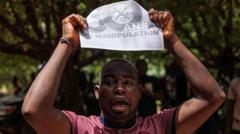In a significant escalation of the military junta's oppressive tactics, Mali's ruling authority has announced the dissolution of all political parties, a move that is anticipated to incite further resistance from opposition groups. This decision was made public through a statement on state television and endorsed by military leader Assimi Goïta, who has been in power since consecutive coups in 2020 and 2021.
Military Junta in Mali Disbands Political Parties Amidst Growing Tensions

Military Junta in Mali Disbands Political Parties Amidst Growing Tensions
Mali's military rulers have taken drastic measures to cement their control by dissolving all political parties in the country.
The decree, issued on Tuesday, declares that "all meetings of members of political parties and organisations of a political character are dissolved across the national territory." This declaration arrives amidst heightened tensions, as political parties have been advocating for a return to democratic governance. Since the military's seizure of power, there has been an increase in crackdowns on dissent, exemplified last week by the abduction of two opposition leaders during a pro-democracy protest.
Despite the junta's commitment to hold elections initially scheduled for February 2022, military authorities now plan to maintain power for at least another five years. The recent national conference held by the military, which was boycotted by major opposition parties, controversially recommended appointing Gen Goïta as president until 2030, leading to widespread condemnation.
The latest edict warns Malians against ignoring the dissolution of political parties, although it does not specify any penalties for noncompliance. Notably, individuals in political or administrative roles are permitted to continue their duties independent of any party affiliation.
Responses from opposition leaders have varied, with some downplaying the junta's actions. Nouhoum Togo, president of the Union for the Safeguarding of the Republic (USR), stated on social media that "no matter how hard they try to make you invisible, your value doesn't depend on their recognition." This sentiment reflects the growing determination of opposition factions to resist military dominance.
The junta's actions are set against a backdrop of alliances with military-led governments in Burkina Faso and Niger, following a marked pivot towards Russia and a significant downgrade in relations with France, the former colonial power. Furthermore, the junta's departure from the regional group Ecowas amid its insistence on restoring democratic rule highlights the deteriorating political climate in West Africa.
As tensions rise in Mali, many are questioning what the future holds for the nation and its aspirations for democratic rule.
Despite the junta's commitment to hold elections initially scheduled for February 2022, military authorities now plan to maintain power for at least another five years. The recent national conference held by the military, which was boycotted by major opposition parties, controversially recommended appointing Gen Goïta as president until 2030, leading to widespread condemnation.
The latest edict warns Malians against ignoring the dissolution of political parties, although it does not specify any penalties for noncompliance. Notably, individuals in political or administrative roles are permitted to continue their duties independent of any party affiliation.
Responses from opposition leaders have varied, with some downplaying the junta's actions. Nouhoum Togo, president of the Union for the Safeguarding of the Republic (USR), stated on social media that "no matter how hard they try to make you invisible, your value doesn't depend on their recognition." This sentiment reflects the growing determination of opposition factions to resist military dominance.
The junta's actions are set against a backdrop of alliances with military-led governments in Burkina Faso and Niger, following a marked pivot towards Russia and a significant downgrade in relations with France, the former colonial power. Furthermore, the junta's departure from the regional group Ecowas amid its insistence on restoring democratic rule highlights the deteriorating political climate in West Africa.
As tensions rise in Mali, many are questioning what the future holds for the nation and its aspirations for democratic rule.




















